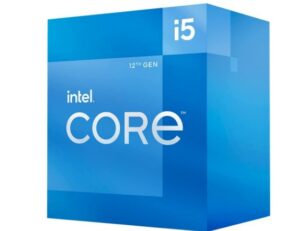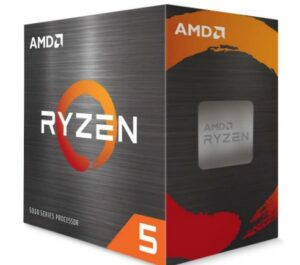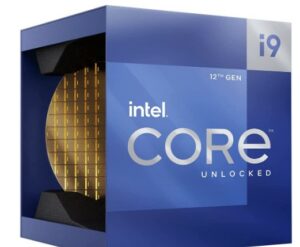Choosing the best hardware for your new gaming PC is never easy. Before you decide on a particular model, you must first choose a brand.
In the world of desktop CPUs, AMD and Intel are the two major players. While Intel certainly had an undisputed lead in the 2010s, the situation has changed dramatically over the past few years.
In 2017, AMD released its first Ryzen CPUs, a long-delayed return to “Team Red.” It’s 2022, and Ryzen’s third generation has proved to be more than a good competitor to Intel’s 9th generation Core CPUs.
So, which CPU brand is better for gaming in 2022? This guide will answer that question.
The Recent Years
Before we get into the real question, let’s look at what the playground has been like lately. For the most part, Intel was a premium choice, boasting more advanced technology and better overall performance, especially in the advanced spectrum.
On the other hand, AMD provided more affordable solutions that relied on raw power to compete with Intel’s offerings.
Although AMD managed to survive as a whole, the situation worsened after 2013. AMD released its FX series of CPUs, which not only came with a high base count (for the time being) but also had tremendous overclocking capabilities. And high base clock speeds.
Needless to say, when they first came out, they were very viable options. However, years passed, and AMD had nothing new to offer. Technology stagnated and rapidly followed Intel, whose CPUs improved year after year.
Certainly, the FX series was soon abandoned to power entry-level and some mid-range gaming veins occasionally.
In contrast, AMD A-Series APUs were found only in basic computers that were not for gaming.
The only glimmer of hope for AMD was the “Zen” architecture that had been evolving over the years as AMD moved downwards. And then finally, it happened in 2017. Flash forward to the present time, and we are here.
Enter AMD Ryzen
The third generation of Ryzen CPUs is based on the Zen 2 architecture. It is fabricated using a 7nm process and contains numerous versatile solutions at all price points.
Overall, Ryzen CPUs can be divided into five groups:
- Ryzen 3 – Designed for entry-level PCs, offering good processing power at remarkably low prices.
- Ryzen 5 – Medium CPUs offer the best value for money and are the best choice for many gaming builds.
- Ryzen 7 – Performance-based solutions will be at home in most high-end gaming PCs.
- Ryzen 9 – Exciting level performance at premium prices, but generally higher than for gaming.
- Threadrapper – Many cores with advanced CPUs that offer exceptional performance, intended for most advanced workstations.
Since 2017, AMD has managed to give Intel a run for its money, offering more powerful solutions at great prices yearly. As a result, many gamers left Intel Camp and moved to AMD.
AMD Ryzen vs. Intel Core
In the days of their FX CPUs, AMD’s robust architecture allowed their processors to achieve higher base clock speeds. Today the situation is slightly different, as the two are more or less identical in this regard.
However, the clock speed shown on paper is a very poor way of estimating the performance of any processor.
They can be misleading, especially in this day and age where you won’t find a gaming CPU with a base clock speed of less than 3 GHz.
Here is the list of our favorite CPUs Best to Buy For use:



Overclocking
As mentioned earlier, the AMD processor was known for its overclocking capabilities. Of course, all Ryzen CPUs are unlocked and can be overclocked, provided the motherboard chipset supports overclocking.
In contrast, not all Intel CPUs are unlocked. Only models marked with a “K” at the end of the model number can be safely overclocked.
We emphasize the word ‘securely’ because, while there are ways to overclock Intel CPUs that are not unlocked, it is generally not appropriate to do so due to the risks of hardware damage.
The overclocking performance will inevitably differ from model to model, although Intel CPUs are currently dominant in this area.
Advanced Intel CPUs can outperform their Ryzen counterparts, resulting in better single-core performance. Enthusiasts who want to squeeze maximum performance out of their CPU will want to keep that in mind.
Core Count
As mentioned earlier, the high core numbers found in AMD’s FX CPUs helped keep Piledriver architecture relevant even after it’s very old.
At the time of launch, the high core and thread count of Ryzen CPUs were also key selling points, especially since they surpassed almost every model that Intel was offering at the time.
Performance
As we just mentioned, Raisin is a leader in multitasking, while Intel Core CPUs can still offer slightly better single-core performance.
So, which is more important for gaming? Well, there is no straightforward answer. In the past, games didn’t usually use more than one core because multi-core CPUs weren’t so common.
But things have changed. We’re in 2022 right now, and there are mainstream CPUs with many core and thread counts – that’s a different story.
For example, many developers now optimize their games to take full advantage of these high-thread counts, which often results in significantly better performance in some games.
However, the benefits of accurate performance will inevitably vary from model to model and game to game, so it is impossible to generalize.
Final Thought
As far as we are concerned, AMD Ryzen is a better option for gaming at the moment, but it remains to be seen whether the situation will change any time soon.
So, why Ryzen? Certainly, they are not perfect in everything, But while advanced Intel CPUs are a better choice for most fans and some professionals because of their overclocking capabilities and superb single-core performance, Ryzen offers a lot less money when it comes to gaming. ۔

